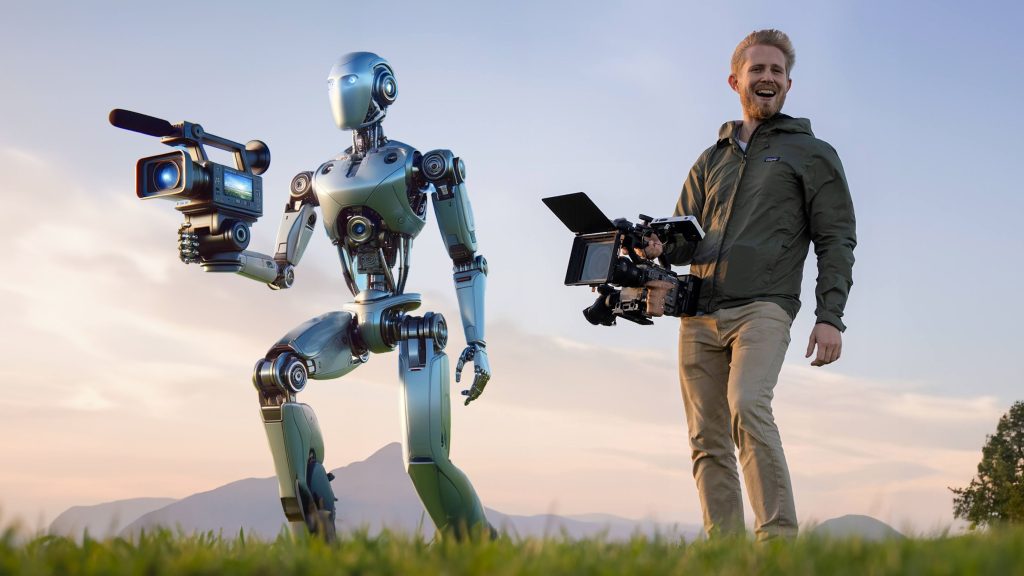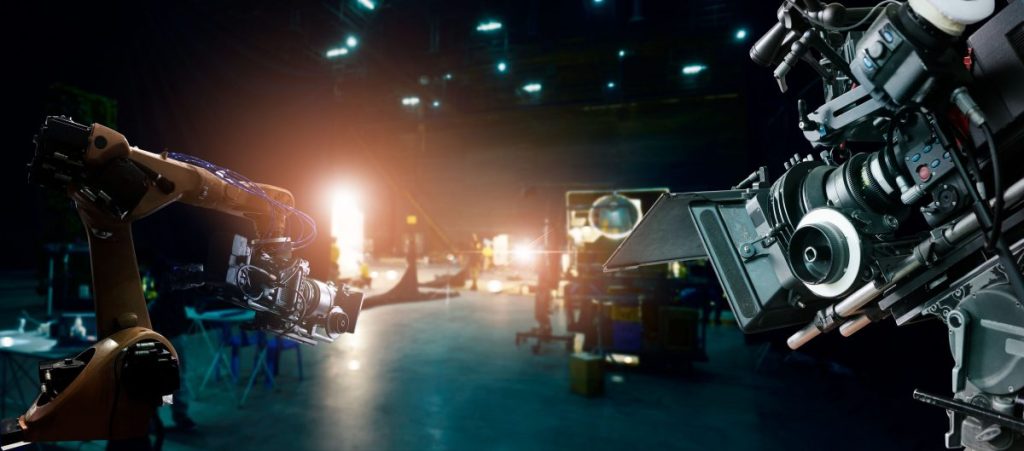Artificial Intelligence (AI) is increasingly transforming the filmmaking industry, offering new tools and techniques that are reshaping how films are conceived, produced, and experienced. From scriptwriting and pre-production to visual effects and post-production, AI is streamlining workflows, enhancing creativity, and expanding possibilities in cinema. This article explores the various applications of AI in filmmaking, its benefits, and the challenges it presents.

Applications of AI in Filmmaking
- Scriptwriting and Story Development:
- AI Tools for Writing: AI-powered tools like GPT-4 can assist in generating plot ideas, dialogue, and character development. These tools analyze existing scripts and literature to suggest new storylines or refine existing ones.
- Script Analysis: AI can evaluate scripts for narrative structure, character development, and dialogue quality, providing feedback and suggesting improvements based on patterns in successful screenplays.
- Casting and Talent Matching:
- AI Casting Tools: AI algorithms can analyze actor profiles, previous performances, and audience reactions to recommend suitable candidates for specific roles. This helps casting directors make more informed decisions and match actors with roles more effectively.
- Pre-Production Planning:
- Scheduling and Budgeting: AI can optimize production schedules and budgets by analyzing past projects and predicting potential issues. This helps filmmakers plan more efficiently and allocate resources effectively.
- Location Scouting: AI-powered tools can assist in finding and assessing filming locations based on specific criteria, such as scenery, lighting, and logistical considerations.
- Visual Effects and Animation:
- AI-Generated Effects: AI algorithms can create realistic visual effects, such as CGI characters and environments, by learning from vast datasets of images and videos. This reduces the time and cost associated with traditional VFX processes.
- Deepfake Technology: AI can generate highly realistic deepfake content, allowing filmmakers to digitally recreate actors or create entirely new characters with lifelike appearances.
- Editing and Post-Production:
- Automated Editing: AI tools can assist in editing by automatically selecting the best takes, organizing footage, and suggesting cuts based on narrative flow and pacing.
- Color Grading: AI can enhance color grading processes by analyzing and adjusting the color balance, exposure, and contrast to achieve the desired visual style.
- Audience Engagement and Marketing:
- Predictive Analytics: AI can analyze audience data to predict film performance and tailor marketing strategies. This includes identifying target demographics, optimizing promotional content, and predicting box office success.
- Personalized Recommendations: AI-driven platforms like Netflix use algorithms to recommend films to viewers based on their preferences and viewing history, enhancing audience engagement.
- Distribution and Monetization:
- Content Optimization: AI can assist in optimizing film content for various platforms, such as streaming services and social media, by analyzing viewer preferences and trends.
- Revenue Forecasting: AI tools can predict revenue streams and financial performance based on historical data, market trends, and audience behavior.

Benefits of AI in Filmmaking
- Increased Efficiency: AI streamlines many aspects of filmmaking, from scriptwriting to post-production, allowing filmmakers to work more efficiently and reduce time spent on repetitive tasks.
- Enhanced Creativity: AI tools provide new creative possibilities by generating ideas, suggesting variations, and creating innovative visual effects that push the boundaries of traditional filmmaking.
- Cost Savings: AI can reduce production costs by automating processes, optimizing resources, and minimizing the need for expensive traditional effects and labor-intensive tasks.
- Data-Driven Insights: AI provides valuable insights into audience preferences, market trends, and film performance, helping filmmakers make informed decisions and tailor their projects for success.
- Accessibility and Inclusivity: AI can help democratize filmmaking by making advanced tools and techniques accessible to independent filmmakers and smaller studios, fostering a more diverse and inclusive industry.
- Improved Quality: AI-enhanced tools can improve the quality of visual effects, sound design, and editing, resulting in a more polished and professional final product.
- Innovative Storytelling: AI enables new forms of storytelling, such as interactive and immersive experiences, by leveraging technology to engage audiences in novel ways.
Challenges and Considerations
- Ethical Concerns: The use of AI in filmmaking raises ethical questions about authenticity, consent, and the potential for misuse, such as creating deepfakes or manipulating performances.
- Creativity vs. Automation: There is ongoing debate about the impact of AI on creativity, with concerns that overreliance on automated tools might stifle original thought and artistic expression.
- Quality Control: While AI can enhance various aspects of filmmaking, ensuring the quality and artistic integrity of AI-generated content remains a challenge, requiring human oversight and intervention.
- Data Privacy: The use of AI for audience analysis and marketing raises concerns about data privacy and the potential for misuse of personal information.
- Skill Requirements: Filmmakers and industry professionals need to acquire new skills and knowledge to effectively use AI tools, which may require additional training and adaptation.
- Bias and Representation: AI algorithms are only as unbiased as the data they are trained on. There is a risk of perpetuating existing biases and stereotypes if AI tools are not carefully designed and monitored.
- Cost of Implementation: While AI can reduce costs in some areas, the initial investment in AI technology and training can be substantial, particularly for smaller studios and independent filmmakers.

Conclusion
AI is revolutionizing the filmmaking industry by offering innovative tools and techniques that enhance creativity, streamline production processes, and improve audience engagement. As AI continues to evolve, it will play an increasingly important role in shaping the future of cinema. However, it is essential for filmmakers and industry professionals to navigate the challenges and ethical considerations associated with AI, ensuring that its integration supports artistic vision and maintains the integrity of storytelling. The ongoing exploration of AI in filmmaking promises to unlock new possibilities and redefine the boundaries of cinematic art.


